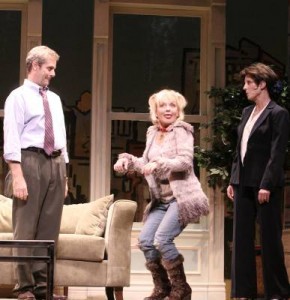
Olympic gymnast. Broadway musical theater star. Dog. A strange trajectory to
be sure, but that’s the path which has brought Cathy Rigby to her starring role
in Sylvia, A.R. Gurney’s comic tribute to “Man’s Best Friend.” Rigby plays the title
role, that of an adorable mutt who finds herself a new master in a Manhattan
park and a new home in a New York city brownstone. Given Rigby’s marvelously
winning performance, it comes as somewhat of a surprise that this is her first
straight play. Hopefully it will lead to many more.
The course of true love never did run smooth, and the fly in Sylvia’s ointment is
new owner Greg’s wife Kate. Their children having left the family nest, Kate and
Greg have moved to Manhattan, and a new pet is exactly what Kate doesn’t
want, especially now that she has resumed her teaching career, in an inner city
high school.
Greg, on the other hand, finds that Sylvia fills a gap in his life. Is he having a
midlife crisis, or is it just that having a pet who thinks of him as God gives his life
new meaning? ‘You’re prejudiced against dogs,” Greg tells Kate. No, she
replies. It’s just that “I want my freedom. I want freedom from dogs!”
Still, in the interest of marital harmony, Kate grudgingly agrees to let Sylvia stay a
few days, on condition that “She is yours. I won’t feed her. I won’t walk her.”
No problem, says Greg, and one day, while walking Sylvia in the park, he meets
another dog owner, Tom, who tells him, “Give a dog a woman’s name, you
begin to think of her as a woman.” Though Tom named his dog Bowser (so that
there would be no possibility of confusing his mutt for a guy), he still needs to
“remind myself to kiss my wife before I say hello to Bowser.”
The more Greg and Sylvia bond, the more frustrated Kate becomes by the
whole situation. She complains to Phyllis, an old Vassar classmate, that Sylvia
“wants to sleep in our bed.” Greg has even found a restaurant that will serve
both man and dog. “I never thought I could hate anyone except Nixon”
confesses Kate.
Greg: She lightens my life.
Kate: She darkens mine.
Is Greg going through a “male menopausal moment?” Is there any possibility
that husband, wife, and pet can find a way to live in harmony? Will Kate divorce
Greg, on the grounds of adultery? Will she sue Sylvia for alienation of affections?
The answers to these and other questions can be found in Sylvia.
Clearly, for Gurney’s play to work, there must be an actress of unique talents in
the title role. Time appears to have stood still for Cathy Rigby, whose last
Olympic appearance was in 1972 and who is now the grandmother of two.
Looking scarcely out of her 20s, Rigby is eminently believable as a dog who
(through the magic of live theater) can converse with both Greg and Kate.
At a talk-back following last night’s performance, Rigby’s husband (and
producing partner) Tom McCoy revealed that his wife had devoted hours and
hours to observing real live dogs in shaping her performance. Her homework has
more than paid off, in work that is magical, marvelous, and miraculous.
Watching Rigby wagging her perky behind, sniffing at strangers, scratching at
fleas, scouting out a fire hydrant, or experiencing the thrill of being in heat (“I just
wanna hump!”), one would swear one was watching a real canine. Rigby is so
good in this role that even though Sylvia carries on real conversations with Greg,
cuddles up to him, tells him “I love you, Greg,” one never once forgets that Sylvia
is a dog, not a woman. Not only does Rigby get to show off her comedic skills,
she has a touching scene near the end of the play in which she pleads for
permission to stay with Greg and Kate that brings tears to the eyes and is the
work of an actress of depth. And she gets to sing a song. More on that later.
Sylvia’s owner (and leading man) is portrayed beautifully by Robert Yacko,
who’s had quite a six months: Can-Can, Too Old for the Chorus, and now Sylvia.
Not only is Yacko a marvelous straight man to Rigby’s comic antics but he does
equally fine work in scenes which require him to show Greg’s inner turmoil, as
when he confesses to Kate his need to “feel more connected to life…to living.”
Suzanne Ford (The Last Days of Judas Iscariot) does very good work as the
“bitch” who wants Sylvia out of her house and life (she calls Sylvia
Saliva…deliberately), letting us see that it’s not that she hates dogs, but rather
that she loves her husband and her marriage and her new “adult” life in the city.
Rigby, Yacko, and Ford get to show off their vocal prowess in one of the play’s
highlights, singing the Cole Porter classic “Every Time We Say Goodbye,” begun
by a left-home-alone Sylvia, then joined one by one by her costars. A lovely
musical moment.
Finally, a trio of roles is brought to terrific comic life by James Stellos, who first
appears baseball cap backwards as Bowser’s alpha male owner. Stellos then
dons a skirt and blouse and sets free his inner female as Kate’s college friend
Phyllis. (Watch Stellos’ dismay when Sylvia sniffs at Phyllis’ skirt, declaring “Nice
crotch here!) Finally, he appears all honey-voiced as Kate’s androgynous
psychiatrist Leslie, who tells Kate, “I let my patients select my gender.”
Director Joel Bishoff, who helmed the recent Too Old for the Chorus and 2006’s
Over the River and Through the Woods, is a director who is equally at home
staging slapstick as he is in the poignant moments between Sylvia and Greg. An
excellent choice to direct Sylvia.
Neil Peter Jampolis has created one of the loveliest and most charming
Manhattan sets I’ve seen. Greg and Kate’s living room is has no rear wall,
allowing us to see the surrounding brownstones, trees, and street corners.
There’s real glass in the three large windows, in which we see the characters’
reflections. The overall effect is that of a New Yorker cover brought to three
dimensional life. Jampolis also designed the subtle lighting for the production.
David Edwards’ sound design allows the audience to hear the actors without
sounding particularly miked. Edwards’ design also incorporates a marvelous
bevy of 50s hit, including Louis Armstrong singing “La Vie en Rose,” Ella
Fitzgerald’s “The Lady is a Tramp,” and others by Sinatra, Patti Page, etc.
Judy Ju had a particularly unique task in designing costumes for this production.
Not only did she have to find character appropriate clothes for Greg and Kate,
she also had to create a women’s suit for a man to wear, and a gender-
ambiguous pantsuit for the therapist, and she gets an “A” for all of these
designs. Finally, there is her dazzling set of outfits for Sylvia. We first see Rigby in a
scruffy sweater and furry boots. Later, after she’s had a shampoo and grooming,
she turns up all pretty in a pink frock that brings out the French poodle in her.
When Sylvia is in heat, she wears a sundress with spaghetti straps, and baggy
pajamas for after being spayed. Brava Ms. Ju!
McCoy Rigby Entertainment puts together quite possibly the most unique large
theater season in the L.A. area. Musicals (My Fair Lady, Johnny Guitar, Camelot,
and the upcoming I Do I Do) alternate with straight plays (The Foreigner, Over
the River and Through the Woods, and the next up Driving Miss Daisy). Not only
that, but the La Mirada Theatre for the Performing Arts is one of the few large
theaters where one can see straight plays like Sylvia on a Broadway sized
proscenium stage. I love that.
With this production, they have found a show to appeal to just about everyone.
Dog lovers will love it of course, cat owners like myself can empathize with the
owner-pet bond, and even those who can’t stand the canine species have
Kate to side with, though I’d guess that by evening’s end, Rigby (and Sylvia) will
have won them over.
Warning: The language is PG-13.
La Mirada Theatre for the Performing Arts, 14900 La Mirada Boulevard, La Mirada.
–Steven Stanley
November 6, 2007
Photos: Michael Lamont




 Since 2007, Steven Stanley's StageSceneLA.com has spotlighted the best in Southern California theater via reviews, interviews, and its annual StageSceneLA Scenies.
Since 2007, Steven Stanley's StageSceneLA.com has spotlighted the best in Southern California theater via reviews, interviews, and its annual StageSceneLA Scenies.







 COPYRIGHT 2024 STEVEN STANLEY :: DESIGN BY
COPYRIGHT 2024 STEVEN STANLEY :: DESIGN BY